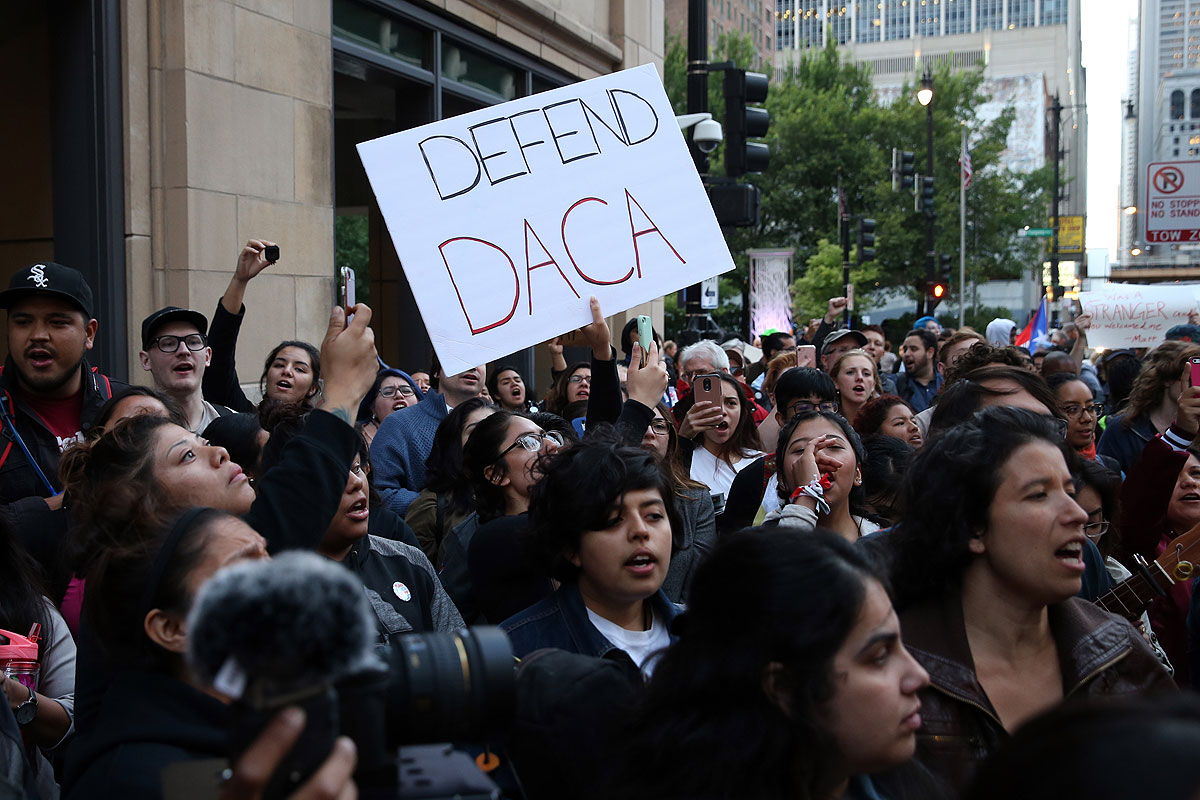Yesterday the Trump administration announced its plan to end the Deferred Action for Childhood Arrivals program, or DACA, with a six-month delay to allow Congress to address it (or not). The program itself was an executive action of the Obama administration and something of a kludge in the absence of action from Congress, but it is what the name suggests: People who entered the country as minors and who met a range of requirements—a high school degree, GED, enrollment in school or employment, and with a minimal criminal record—could defer deportation for two years at a time while becoming eligible for a work permit and social security number. That in turn makes them able to open a bank account or get a driver's license (but not welfare, unemployment benefits, or other safety-net programs).
At Vox, Dara Lind has a good overview of how immigration law and enforcement has, over the past few decades, become a series of kludges. "Undoing DACA would widen the gulf between reality and law," she writes. "And that gulf is, in some ways, broader than it’s ever been before. What truly makes the end of DACA unprecedented, in the broad sweep of U.S. history, is the size of that gap between the law and the reality."
DACA brought some clarity and stability to a subset of undocumented immigrants, but not a lot: The deferrals are temporary, there's no pathway to citizenship, and the benefits are significant but very narrow. Nonetheless, it's had some profound effects on its recipients.
Some of those effects are outlined in a study by Nolan G. Pope, a Ph.D. candidate in economics at the University of Chicago, who looked at the results from the first two years of the program, 2013 and 2014. He found that it moved 50,000 to 75,000 immigrants into the workforce, a decent percentage of the more than 600,000 people who had been approved under DACA by the end of 2014—with about 950,000 eligible for the program. Another minimum requirement to be eligible is a GED, and he found "suggestive evidence," from an increase in the number of GED tests given in Spanish, that an additional 25,000 people got one as a result.
But perhaps the most significant effect is on income. Besides encouraging immigrants to pursue an education—an impressive "17 percent of DACA recipients are pursuing an advanced degree," according to the Cato Institute—the design of DACA is supposed to push recipients not only into employment but into better jobs by allowing them access to a social security number and (in most states) a driver's license. It seems to have worked—Pope found that, among the bottom 90 percent of earners in the country, DACA-eligible workers made $1,364 more from 2012 through 2014 than comparable, working-age, non-eligible undocumented immigrants.
Cato found that DACA recipients earn, on average, $17 per hour and $34,000 per year (despite an average age of 22). That will cause a big impact if the program goes away: a $200 billion hit to the national economy and $60 billion in lost tax revenue, according to their calculations. For Illinois, one of the biggest DACA states, it would be an almost $7 billion hit to the economy over that decade.
Similar findings come from work by Roberto G. Gonzalez, a former University of Chicago professor now at Harvard who was a youth worker for a decade in the city. Gonzalez found that young students were "running into a wall" when they got to high school, when their friends started to work, drive, and make plans for college. That fed into a career studying young undocumented immigrants, with a recent focus on DACA. Gonzalez's in-depth studies of smaller samples, including DACA recipients in Illinois, mirror Pope's findings:
Just 16 months into the program, 59 percent of respondents reported having found a new job. Over one fifth of survey respondents had obtained a paid internship.
Undocumented immigrants aren’t forbidden from having credit cards or bank accounts but having a Social Security number makes it a lot easier. Almost one-half of our survey respondents opened up their first bank account after receiving DACA, and a third acquired their first credit card. Close to 60 percent of our respondents had obtained a driver’s license.
[snip]
DACA’s benefits appear to be greatest for people with degrees from four-year colleges. They were more than 1.5 times as likely to obtain new jobs and increase their earnings than DACA beneficiaries who never went to college. They were apparently able to make full use of their credentials and networks.
One 18-year-old Illinois resident they interviewed said that prior to the program, being in school felt "worthless in the end," but afterward she realized "OK, I actually have a chance."
What's interesting about her comment, and the findings in general, is that DACA still had the potential to be "worthless in the end" because of what it is: literally deferred action on deportation, incumbent on short-term renewals, with no route to citizenship. That's even setting aside its political fragility in the first place.
Nonetheless, those eligible applied in substantial numbers because they saw a potential benefit—and it seems they were right. Now Congress has just six months to decide its worth to all of us.



